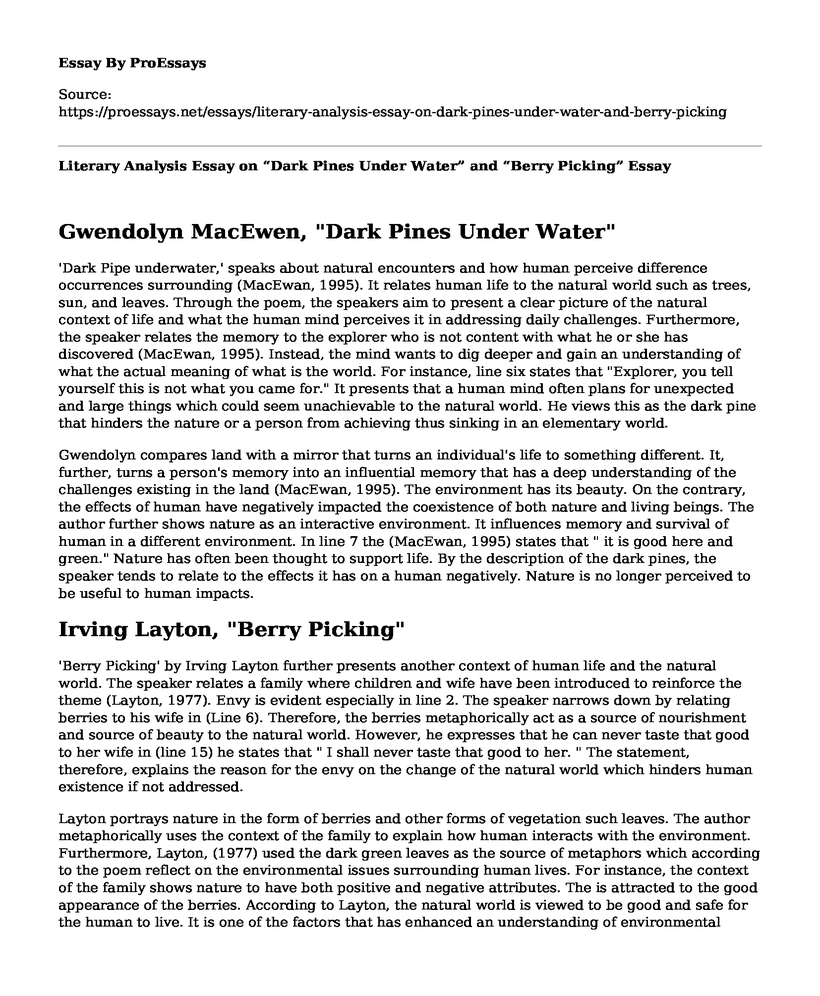Gwendolyn MacEwen, "Dark Pines Under Water"
'Dark Pipe underwater,' speaks about natural encounters and how human perceive difference occurrences surrounding (MacEwan, 1995). It relates human life to the natural world such as trees, sun, and leaves. Through the poem, the speakers aim to present a clear picture of the natural context of life and what the human mind perceives it in addressing daily challenges. Furthermore, the speaker relates the memory to the explorer who is not content with what he or she has discovered (MacEwan, 1995). Instead, the mind wants to dig deeper and gain an understanding of what the actual meaning of what is the world. For instance, line six states that "Explorer, you tell yourself this is not what you came for." It presents that a human mind often plans for unexpected and large things which could seem unachievable to the natural world. He views this as the dark pine that hinders the nature or a person from achieving thus sinking in an elementary world.
Gwendolyn compares land with a mirror that turns an individual's life to something different. It, further, turns a person's memory into an influential memory that has a deep understanding of the challenges existing in the land (MacEwan, 1995). The environment has its beauty. On the contrary, the effects of human have negatively impacted the coexistence of both nature and living beings. The author further shows nature as an interactive environment. It influences memory and survival of human in a different environment. In line 7 the (MacEwan, 1995) states that " it is good here and green." Nature has often been thought to support life. By the description of the dark pines, the speaker tends to relate to the effects it has on a human negatively. Nature is no longer perceived to be useful to human impacts.
Irving Layton, "Berry Picking"
'Berry Picking' by Irving Layton further presents another context of human life and the natural world. The speaker relates a family where children and wife have been introduced to reinforce the theme (Layton, 1977). Envy is evident especially in line 2. The speaker narrows down by relating berries to his wife in (Line 6). Therefore, the berries metaphorically act as a source of nourishment and source of beauty to the natural world. However, he expresses that he can never taste that good to her wife in (line 15) he states that " I shall never taste that good to her. " The statement, therefore, explains the reason for the envy on the change of the natural world which hinders human existence if not addressed.
Layton portrays nature in the form of berries and other forms of vegetation such leaves. The author metaphorically uses the context of the family to explain how human interacts with the environment. Furthermore, Layton, (1977) used the dark green leaves as the source of metaphors which according to the poem reflect on the environmental issues surrounding human lives. For instance, the context of the family shows nature to have both positive and negative attributes. The is attracted to the good appearance of the berries. According to Layton, the natural world is viewed to be good and safe for the human to live. It is one of the factors that has enhanced an understanding of environmental beauty right from the description of the fruits to relating it with good stories such as those that accommodate his family and improve lives.
References
Layton, I. (1977). The Poems of Irving Layton (No. 12). McClelland and Stewart.
MacEwan, G. (1995). Dark Pines under Water; The Discovery. Meanjin, 54(2), 327.
Cite this page
Literary Analysis Essay on "Dark Pines Under Water" and "Berry Picking". (2022, Nov 01). Retrieved from https://proessays.net/essays/literary-analysis-essay-on-dark-pines-under-water-and-berry-picking
If you are the original author of this essay and no longer wish to have it published on the ProEssays website, please click below to request its removal:
- Critical Essay Sample on Death of a Salesman
- Compare and Contrast Essay on Oedipus the King and Hamlet
- Frankenstein and East of Eden Essay
- Where Are You Going? Where Have You Been? by Joyce Carol Oates Essay
- Essay Sample on Poe's Relationships With Women
- Essay Example on Themes in Literary Works: Major vs. Minor
- Be Clear & Specific: Writing for Impact & Beauty - Essay Sample







